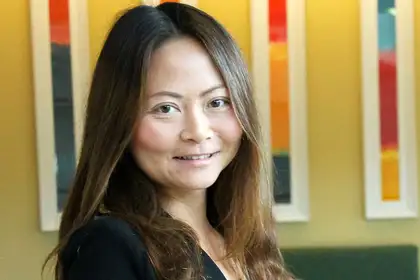
Marsden Fund researcher Dr Liangni Sally Liu.
Government policy changes in New Zealand and China are creating pressures for only child migrants from China who face difficult decisions juggling new lives with cultural expectations to care for ageing parents.
Dr Liangni Sally Liu, a lecturer in Massey University’s Chinese programme in the School of Humanities, says a policy change constraining Chinese migrant families sponsoring elderly parents to immigrate to New Zealand is akin to “rewriting traditional Chinese cultural practice and the family norm of unification.”
As well as New Zealand’s tightened policy, Chinese families are also anxious about China’s revised legislation requiring children to visit parents more regularly or risk being sued.
In her three-year Marsden-funded study, titled Floating families? New Chinese migrants in New Zealand and their multi-generational families, Dr Liu takes these policy changes as a starting point for exploring the changing dynamics of New Zealand’s growing number of Chinese migrant families.
About half of New Zealand’s 171,411 Chinese residents were born in China, according to the 2013 Census, with many migrants and their parents making up a significant proportion of the country’s Chinese-born population.
New Zealand’s 2016 policy change has temporarily closed the Parent Category to receive any more applications. “Whether this category will be open again for applications is uncertain,” says Dr Liu.
NZ restrictions changing Chinese family practices
While some adult migrants bring their elderly parents here for retirement, others come to support their adult children’s career development by providing care for their grandchildren. In return, adult migrant children assume responsibility for supporting their parents when they are unable to live on their own.
With many Chinese adult migrants part of a new trend of becoming global citizens – they may have multiple residencies and business connections, and children who opt to live and study in other countries – the care of elderly parents is becoming problematic, Dr Liu says.
Support for family reunification
Before the new restrictions New Zealand’s policy had supported family unification, as it recognised the value of skilled migrants to the New Zealand economy as well as the benefits of extended families and multiple generations being together, says Dr Liu. The increasing costs of elder care to the New Zealand taxpayer are part of the rationale for the new restrictions, she says.
“This policy change is particularly challenging for many Chinese migrant families because of a strong tradition of filial piety in Chinese culture, which requires the adult children to provide daily care for their elderly parents,” she says. “The high proportion of Chinese parents admitted over the last three decades is a reflection of this cultural factor.”
A lack of welfare and the cultural stigma about placing elderly people in rest homes in China adds to the complexity of the issue. Dr Liu’s research will also look at the implications of China’s 2013 policy changes regarding the “left behind” elderly.
Policy change creating two classes
A Chinese migrant herself facing difficulties arranging care for her ageing parents in China, she has a personal as well as academic interest in the issue.
After working in New Zealand for many years, she discovered the new immigration policy blocked her parents from moving here. “The feeling is like a betrayal,” she says. “I am a New Zealand citizen like many other locals, but the new policy creates two classes of citizens – one class is those who can enjoy a family life, while the other is not able to. As the only child in my family, taking care of my parents is a serious issue.”
Dr Liu says unlike Chinese migrants of early last century who were motivated by economic factors, most migrants from China today seek a better lifestyle, advanced education system, and the securing of foreign passports.
Many of the 50 new Chinese migrants she has interviewed say they are attracted to this country because they perceive it as “safe, liberal, and easy-going. Politically, it is democratic and the stable government is perceived as better than China’s. In practice, the entry criteria and living costs are lower than other ‘white settler’ countries. The great natural environment, advanced education system, and the welfare system are also attractive.”
Dr Liu says her research will provide fresh understandings of how migrants’ extended and multi-generational families from China adapt to New Zealand. She will use a novel three-generation framework encompassing migrants, their children and parents to investigate how migratory mobility and intergenerational dynamics affect individual family members and shape migrants’ family life and sense of identity and belonging.